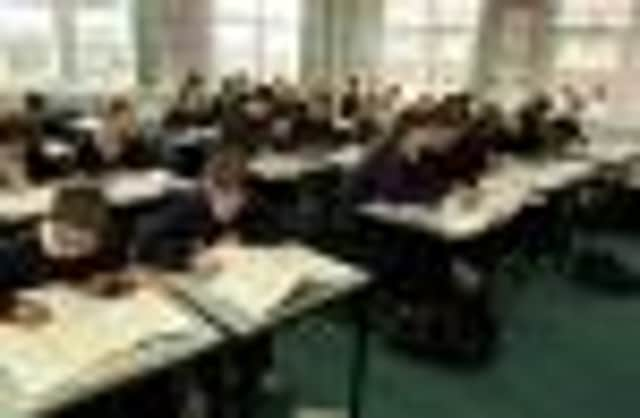Michael Kelly: Schools in deprived areas deserve extra help


The exam results league tables published yesterday show no surprises at all. Rather they confirm the story that is retold year after year. The state schools which do best at churning out candidates for university education are those in the most affluent areas of Scotland. Cults, Dunblane and Newton Mearns are all names which define middle-class enclaves, while Wester Hailes and Govan are bywords for working-class areas of multiple deprivation.
Assuming, as we must, that intelligence and talent are evenly spread throughout the country, is this proof that we have a two-tier educational system? Certainly, middle-class parents would interpret the figures that way. The most important thing that these driven mothers and fathers want for their children is a university education to guarantee a continuation of the lifestyle, the position in society and the income that they enjoyed.
Advertisement
Hide AdAdvertisement
Hide AdThey want other things, of course: polite, respectful, self-reliant children with a sense of responsibility towards society and a set of ethical values which they can communicate articulately. But all those are added extras. They are no substitute if the child does not get his or her Highers. These parents are prepared to pay for it – either by fees paid direct to a private school or by way of inflated house prices in areas renowned for good schools. And they supplement the teachers’ work by hiring tutors to shore up any weaknesses. It’s very much payment by results.
It is fairly straightforward for schools in affluent areas to provide that level of service. Basically, all they need is a good head teacher. The good pupils are already provided. They are surrounded by books at home and proof that education is valuable and worthwhile. These schools can call upon a group of highly motivated parents to support their work. And there is no shortage of funds to finance the annual ski trip to France.
There is no excuse for such schools not achieving high rates of academic success. Yes, to get to the top of these tables means that they are well run. They have head teachers who lead. They have dedicated and motivated staff who follow. Discipline is enforced. Yet rather than concentrating on and praising the schools which find themselves succeeding in such a favourable environment we should be castigating those schools which are equally well placed but which do not come up to the mark. These are the real failures.
Those schools serving the poorest parts of Scotland and which produce very few who can aspire to university are not failing. They are not in a second tier. Rather they are forced to operate in a hostile social environment. They are dealing with some children who are sent to school without breakfast. Many of their pupils come from backgrounds which have, if not contempt for education, indifference to it. These children don’t see books casually lying around in every room. They have no private area in which to study away from the blare of the television and video games. Their health is, on average, poorer. The payback from higher education is beyond their understanding because in benefit-dependent families the children see no connection between hard work and income. Often these children’s educational chances are destroyed before they get to Primary One.
These schools often contain the most highly dedicated of teachers. The schools themselves do not lack public resources. They do good work. To evaluate their success by listing them by exam results insults the efforts that are invested in improving their pupils’ life chances. That is why it is correct that the Scottish Government does not produce these league tables. Assessing educational achievements needs much more sophisticated measures.
Ken Macintosh, Labour MSP for the area which contains two of the very best state schools, St Ninian’s and Williamwood High, argues that the best school in East Renfrewshire is neither of these but St Luke’s in Barrhead, because it has been so successful in meeting the much wider range of demands its catchment area imposes on it. In his experience, the most important factor explaining why some schools in poor areas buck the trend is the amount of community support that they can attract. If the parents buy into the school’s philosophy, exceptional results can be achieved.
But should such schools be judged by different standards, given the different problems that they have to solve? This line of argument no doubt shocks elitists, who refuse to look beyond academic performance. To others it may seem like throwing in the towel on behalf of thousands of Scottish kids. Yet it is realistic. Schools cannot solve all the social problems created by deprivation. Such schools might strive to teach pupils self-confidence, the means to learn, an awareness of a wider world. Society must ensure that they are given opportunities to enter that world by their own effort as they progress through their young lives.
Hugh Henry, Labour’s education spokesman, did argue that the league tables showed a disturbing trend towards two levels in Scottish education. He was not, however, condemning schools in difficult areas for failing. Rather, he argues that the current Scottish Government is failing these schools. By switching resources away from poorer areas to more affluent ones, the inadequate support that these areas have been receiving is being reduced further.
Advertisement
Hide AdAdvertisement
Hide AdScotland has always been proud to boast of a more enlightened attitude to education and a better education system than England. Like many boasts, this probably would not stand up to examination. However, given that we have that conceit for ourselves, we should be prepared to devote the resources to maintaining a broadly level education playing field.
It is clear that schools and teachers are delivering what is possible. It is up to society to demand that deprived areas are given the resources necessary to counter the environment against which they have to struggle.